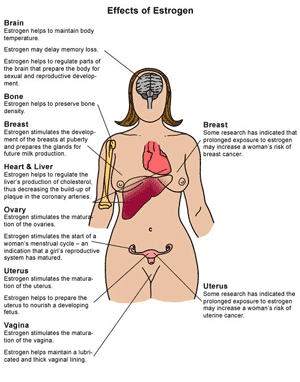 Hormonal fluctuations in both women and men account for their aberrations in their thinking, behavior, moods, and their sexuality, expressed in the symptoms of depression. The crucial question is: Given its close connection with depression, is estrogen an antidepressant? Research scientists have conducted various studies, which have indicated the impact of estrogen on the brain with respect to memory function and postmenopausal women. According to their studies, approximately 35 percent of women have mild premenstrual physical and depressive symptoms due to the rapid decline in estrogen level. Among the pathways, estrogen plays a critical role in the proper flow of blood to different parts of the brain, thereby instrumental in optimizing emotion, memory, and cognitive functions. Prior to the actual onset of menopause, estrogen level in women significantly decreases as much as 50 to 75 percent. This may explain why women not only experience depression twice as much as men do but also are two times more likely to be hospitalized in their lifetimes. This discrepancy has little to do with the fact that women seek psychiatric help more frequently than men do, or the fact that women are more stressed out than men are.
Hormonal fluctuations in both women and men account for their aberrations in their thinking, behavior, moods, and their sexuality, expressed in the symptoms of depression. The crucial question is: Given its close connection with depression, is estrogen an antidepressant? Research scientists have conducted various studies, which have indicated the impact of estrogen on the brain with respect to memory function and postmenopausal women. According to their studies, approximately 35 percent of women have mild premenstrual physical and depressive symptoms due to the rapid decline in estrogen level. Among the pathways, estrogen plays a critical role in the proper flow of blood to different parts of the brain, thereby instrumental in optimizing emotion, memory, and cognitive functions. Prior to the actual onset of menopause, estrogen level in women significantly decreases as much as 50 to 75 percent. This may explain why women not only experience depression twice as much as men do but also are two times more likely to be hospitalized in their lifetimes. This discrepancy has little to do with the fact that women seek psychiatric help more frequently than men do, or the fact that women are more stressed out than men are.Following pregnancy, women also experience a drastic decline in estrogen level. Consequently, 50 to 70 percent women experience postpartum depression within the first 10 days following delivery, and approximately 10 percent may suffer a major depression. According to a study, more than 60 percent with postpartum depression may develop depression later in life. During menopause and perimenopause, women's dramatic decline in estrogen level makes them more vulnerable to extreme mood swings. Many studies attest to the close link between estrogen and mood swings.
An NIH (National Institutes of Health) study on the role of estrogen as an antidepressant indicated that women patients receiving high-dose estrogen experienced significant improvement in their symptoms of depression. In addition, their improvement sustained beyond the study period. Scientists have to believe that estrogen and other hormones may benefit those patients with treatment-resistant depression. The rational is based on the assumption that antidepressants may only boost the "level" of neurotransmitters but without enhancing the "quality" of those transmitters, and therefore may not be efficacious in treating some depression, especially those with low estrogen and testosterone levels.
Studies have also indicated that patients suffering from anxiety, another mood-related disorder attributed to peri- and postmenopausal depression. Symptoms of anxiety, such as dry mouth, waking up in the middle of the night short of breath, excessive sweating, and nausea, can be relieved with estrogen treatment.
Other hormones that may play havoc with depression are testosterone and the thyroid hormone. Testosterone, which is responsible for energy and sexual function in women as well, has an antidepressant effect on the brain. Therefore, a decline in testosterone may precipitate depressive episodes. Disorder in the thyroid hormone may produce paranoid delusions in patients suffering from bipolar depression.
This remarkable coenzyme, which occurs naturally in younger bodies, but gradually diminishes with age, may very well be one of your best defenses against disease and aging...


No comments:
Post a Comment